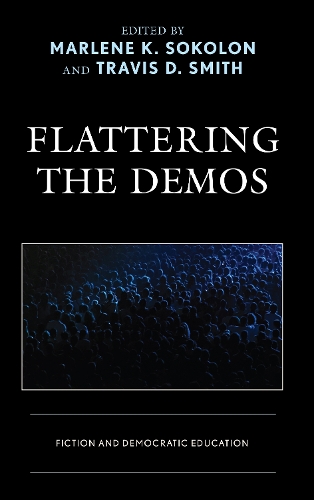
Flattering the Demos: Fiction and Democratic Education
(Hardback)
Publishing Details
Flattering the Demos: Fiction and Democratic Education
By (Author) Marlene K. Sokolon
Edited by Travis D. Smith
Contributions by James Beneda
Contributions by Kimberly Hurd Hale
Contributions by Alexandra Manoliu
Contributions by Steven Orr
Contributions by Bruce Peabody
Contributions by Derval Ryan
Contributions by Marlene K. Sokolon
Contributions by Travis D. Smith
Bloomsbury Publishing PLC
Lexington Books
31st October 2018
United States
Classifications
Professional and Scholarly
Non Fiction
Politics and government
Political science and theory
321.8
Physical Properties
Hardback
182
Width 158mm, Height 232mm, Spine 20mm
454g
Description
This volume brings together reflections on the relationship between politics and storytelling, especially within the democratic context. Examples are drawn from the ancient and modern worlds, from classical Greek tragedy and Shakespeare to television, science fiction, and comic books, in order to examine the relationship between the philosophical and the poetical. As a political phenomenon, storytelling is used to confirm the prejudices and uphold the principles that prevail within the culture that produces it, while also providing a means for sparking a criticism of that culture from within. What role should literature play in educating a population, especially as regards ones civic responsibilities and relationship to the political regime, and how does it compete with or complement rational inquiry in providing that education What observable effects does storytelling in fact tend to have, especially among democratic peoples, and what effects does it have on their political identities, viewpoints, commitments, and behavior Which passions does it stoke: our hopes or our fears, our suspicions or our loyalties Can storytelling in democratic times offer resistance to the logic and momentum of democratization or does it only reliably propel it further forward Does democratic literature only cater to the satisfaction of personal appetites or can it ennoble people so that they are more apt to fulfill their responsibilities to each other as moral agents and fellow citizens This volume takes diverse approaches to addressing questions like these.
Reviews
Sokolon, Smith and the impressive list of contributors to this book take ideas seriously, and see storytelling as a key to understanding political philosophy. Focusing on fictional sources of political thought, they see the democratic imagination of citizens enlivened, even shaped by poetry, narrative storytelling, and other non-traditional forms of literature. This important book, if paired with Thomas Cronins Imagining a Great Republic, will change the way we think about political philosophy and democratic citizenship. -- Michael A. Genovese, President, Global Policy Institute, Loyola Marymount University
"All too often in our democratic republic, the task of shaping the tastes, passions, and civic character required for responsible self-government falls not to our schools and educators, but to the 'storytellers' among us. The authors of the literary fiction, television, and cinema that we consume on a daily basis shape the way we think about, and thus act towards, our political institutions, obligations, and identities.Flattering the Demos shows us the dangers inherent in such an enterprise as well as the potential pathways for democratic renewal that storytelling, at its best, affords us." -- Bernard J. Dobski, Assumption College
Author Bio
Travis D. Smith is associate professor of the Department of Political Science at Concordia University. Marlene K. Sokolon associate professor of the Department of Political Science at Concordia University.
